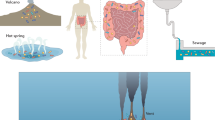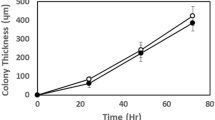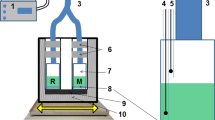Abstract
THE rate of oxygen consumption by a bacterial suspension can be measured by observing the change in concentration of oxygen in the air in contact with the culture or dissolved in the suspension. The rate of consumption is known as the oxygen demand rate which Gaden1 defines as the maximum use of oxygen by a culture in an ideal environment. Oxygen utilization is defined by the author as the terminal use of oxygen in respiration, that is, the formation of water. In this investigation both oxygen demand and oxygen utilization of a culture of Pseudomonas fluorescens during respiration only were simultaneously measured.
This is a preview of subscription content, access via your institution
Access options
Subscribe to this journal
Receive 51 print issues and online access
$199.00 per year
only $3.90 per issue
Buy this article
- Purchase on Springer Link
- Instant access to full article PDF
Prices may be subject to local taxes which are calculated during checkout
Similar content being viewed by others
References
Gaden, E. L., Sci. Rep. First Super. Sanita., 1, 161 (1961).
Arthur, R. M., App. Microbiol., 12, 289 (1964).
Arthur, R. M., App. Microbiol., 13, 125 (1965).
Gaden, E. L., Chem. and Indust., 74, 154 (1955).
Finn, R. K., Bacteriol. Rev., 18, 254 (1954).
Author information
Authors and Affiliations
Rights and permissions
About this article
Cite this article
ARTHUR, R. Comparison of Oxygen Demand Rates and Oxygen Utilization Rates. Nature 209, 104–105 (1966). https://doi.org/10.1038/209104b0
Issue Date:
DOI: https://doi.org/10.1038/209104b0
Comments
By submitting a comment you agree to abide by our Terms and Community Guidelines. If you find something abusive or that does not comply with our terms or guidelines please flag it as inappropriate.



